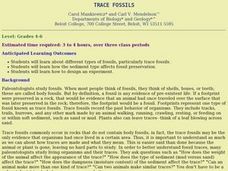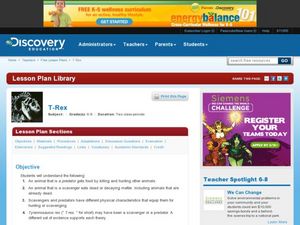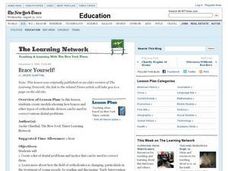Curated OER
Animal Classification
Students are introduced to the concept of classification as it relates to objects, information, and characteristics. In this classification lesson, students research a variety of animals. Students study the Linnaeus's system of...
Curated OER
Science: Making Trace Fossils
Students explore types of fossils and discover how sediment affects fossil preservation. They focus their study on trace fossils and create their own using sediment, water, and a small organism such as a snail or lizard. Students use...
Curated OER
T-Rex
Learners examine the differences between a scavenger and a predator. For this predator lesson students research an animal and study its physical traits.
Curated OER
Digestive System Analogies--A Group Activity
Students study the human digestive system in order for the students to relate common kitchen items to the function of specific digestive organs. They list major organs on one side and find the item or appliance most analogous to the...
Curated OER
Acids, Bases, Acid-Base Reactions
In this chemistry worksheet, students read and study the chapter to answer 110 problem solving and short answer questions related to acids and bases.
Curated OER
Brace Yourself!
Learners create a list of dental problems and tactics that can be used to correct them. They then study about how the field of orthodontics is changing, and work in cooperative groups to research and build models of how various types of...
Curated OER
Shark Attack
Students study the white shark and the red triangle. In this critical thinking activity students assess the validity of facts about sharks and create a public service announcement either promoting shark or human protection.
Curated OER
Nouns Search
In this nouns worksheet, students read ten sentences and underline the nouns in alphabetical order in each sentence. Students study the first one done for them.
Curated OER
Shhhhhhhh!!!!!
Students recognize and practice putting certain letters together as they make unique sounds in one mouth movement. This lesson focuses on the digraph /sh/. They study and recite the tongue twister "Shelly's aunt, Sharon shears sheep" and...
Curated OER
Who Are the People in Your Family?
In this family members worksheet, students view and study eight pictures in order to choose the appropriate answer to eight multiple choice questions involving naming specific family members.
Curated OER
The Pipa Pipa Frog
The Pipa Pipa frog is the focus of this reading comprehension worksheet. After reading a passage and studying a photograph of the frog, students complete eighteen phrases that tell about the frog.
American Museum of Natural History
What's This? Leeches
Who actually likes leeches? Meet a scientist that makes his living letting leeches feed on him. Pupils learn about the characteristics of leeches and different variations of the species. The lesson works as a remote learning resource or...
Curated OER
Coming Soon: Sodas with Vitamins
Students react to a series of statements about sodas, then read a news article about the addition of vitamins to sodas to increase sales. In this nutrition and current events lesson, the teacher introduces the article with a discussion...
Curated OER
North American Animals
Students are introduced to the anatomy and characteristics of the North American wolf, grizzly bear and bobcat through a purchased kit. They cast plaster models of each of the animals for study and display.
Curated OER
The Ice Age
Students study the differences in the Ice Age terminology and what causes them. In this Ice Age lesson students examine what plants and animals lived during the Ice Age.
Curated OER
The Ice Age
Students study the ice age and the causes of it. In this Ice Age lesson students examine why those animals became extinct and complete activity sheets.
American Chemical Society
Development of Baking Powder
Did you know baking powder can be used to treat acne, whiten teeth, and make sugar cookies? The lesson on the development of baking powder is ready-to-go with no preparation required. Through readings, pupils answer questions, complete...
American Museum of Natural History
What Do You Know About T. Rex?
There's so much to learn about dinosaurs. A 10-question quiz tests knowledge of the more detailed characteristics of the Tyrannosaurus Rex. As individuals complete the quiz, they better understand how fossil records helped define some of...
Curated OER
Save Water
For this water conservation game, learners collaborate with classmates to play a game about saving water. Students form groups and use the provided game boards and pictures to study water conservation.
Curated OER
Dictionary Skills
Students use a dictionary to review their spelling words. They discover how to use guide words in the dicotionary to find the words. They must write their spelling word and the page and guide words found on the page where the word is found.
Curated OER
Baleen Whales vs. Toothed Whales
Second graders review mammal characteristics and study two types of whales. In this mammal study lesson, 2nd graders discuss mammals and define their five characteristics. Students complete a whale worksheet and define differences...
Alabama Learning Exchange
Is That a Whale?
Pupils research the characteristics and examples of the two main types of whales. They work in groups to study the habitats of each type of whale before developing a slideshow presentation of the information.
Curated OER
Micro-organisms
Learners learn what a micro-organism is. In this micro-organism instructional activity, students understand that micro-organisms may be too small to see. Learners learn microorganisms could be bacteria, fungi, something beneficial or a...

























